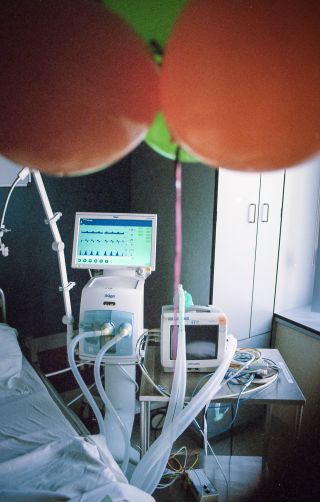Chronic Illness
What Would You Do to Save Your Child?
Parenthood can feel like it means moving mountains. Remember your own self-care.
Posted May 31, 2023 Reviewed by Vanessa Lancaster
Key points
- Don't be afraid to speak up if you notice something unusual in your child's development.
- The best thing you can do if you know someone with a chronically ill child is ask how you can help.
- Many parents with chronically ill children are afraid to burden their friends with their struggles.

"How have you benefitted from COVID?"
This was the question I posed to my podcast listeners and Facebook friends in the late summer of 2020. I had already interviewed a dozen comedians who had plenty of time on their hands due to the remaining restrictions on public gatherings and more than a dozen psychologists whose books had been published during this weird in-between time.
Everyone was angry, the world just kept getting more and more polarized, and one look at the evening news seemed to make things continuously much worse.
I needed to find someone who had actually benefitted from COVID, to whatever extent that meant, because I just wanted to bring some happiness to people.
But I also think I needed something to believe in myself.
"COVID has given me the opportunity to reach scientists and doctors that would have been impossible to get in touch with before."
David and Stacey Ogman had a three-year-old daughter and were looking forward to the birth of their son. Stacey's pregnancy had been normal, and although the first week of their newborn son's life had required a few extra days in the hospital, Jordan had spent the first year of his life meeting all his milestones within normal limits.
But after his first birthday, everything changed.
His developmental delays became more and more apparent, and doctor after doctor could provide no explanation. It took almost a year until they were given a diagnosis: Jordan has TECPR2, a disease with symptoms similar to those of Lou Gehrig's disease (ALS) or Parkinson's.
Don't be surprised if you haven't heard of TECPR2. At the time of Jordan's diagnosis, David and Stacey Ogman knew of only 11 other children who had been diagnosed with TECPR2, and the doctor who diagnosed Jordan stated, quite simply, that no child survived this disease.
The Ogman's were devastated and quickly launched into action, finding the best doctors who worked with gene therapy, a thread that seemed likely to hold the most hope for a solution, if not a cure, given previous work with Parkinson's patients.
"Every day is a good day," David told me when we first spoke.
Although having followed his fight for his child's life over the last few years, I know that some days are clearly not as good as others.
But, for David, COVID paused the world long enough for the media to pick up on his son's story and for several celebrities to throw attention his way, including Dr. Oz, former Florida Congressman Ted Deutch, and former Miami Dolphin Quarterback Jay Fiedler.
The ultimate goal is to continue raising money, raising awareness, and expanding the potential opportunity for further research. The problem is that David, and his son, Jordan, are racing against the clock of a very deadly, degenerative disease.
How can you help support someone with a chronically ill child?
According to the website hearthookhome.com, you can support someone with a chronically ill child in many ways, both big and small.
- Don't be afraid to reach out to your friend and ask them how you can help. Many people seem to fear that talking about something frightening will make it worse, but often a parent may look for someone to confide in but be afraid of being a burden.
- Ask specific questions: How can I help? What can I do to make this week easier? I'm going to the grocery store. Do you need anything?
- Offer to help out with the needs of their other children if they have other children.
- Visit your friend at the hospital to keep them company or give them a break from sitting in the hospital. A fresh cup of coffee, 15 minutes of fresh air, anything that can help change the monotony of the hospital routine will be of immense value. Sometimes, it's the little things that can make the biggest difference.
References
If you would like to learn more about TECPR2 go to https://savingjordan.org/


